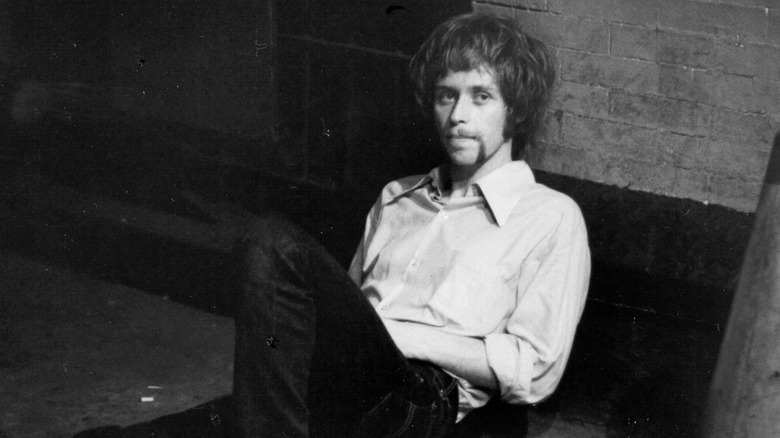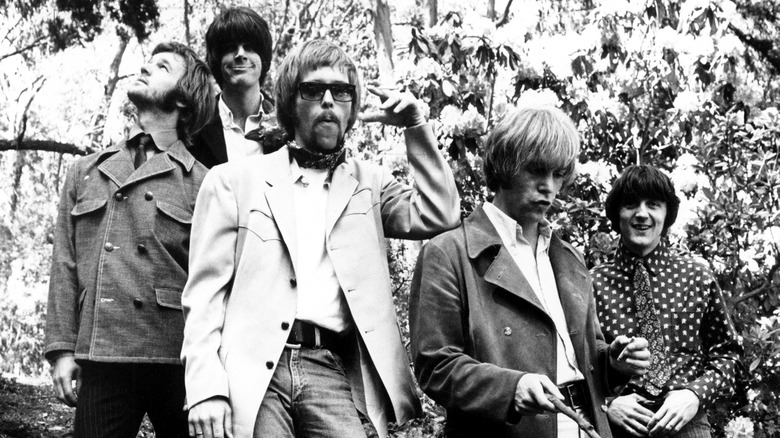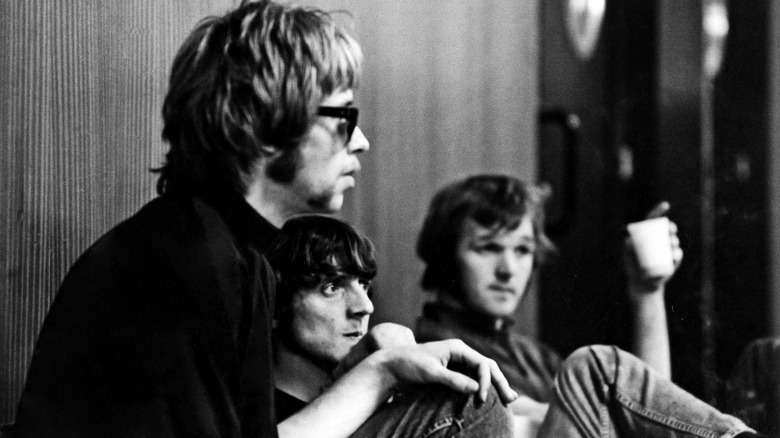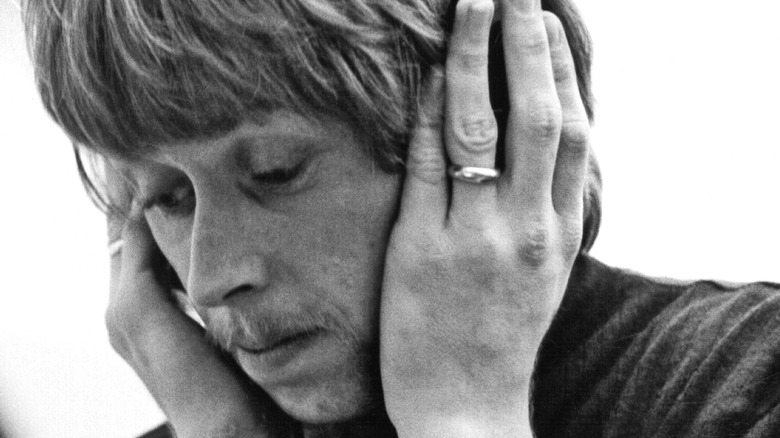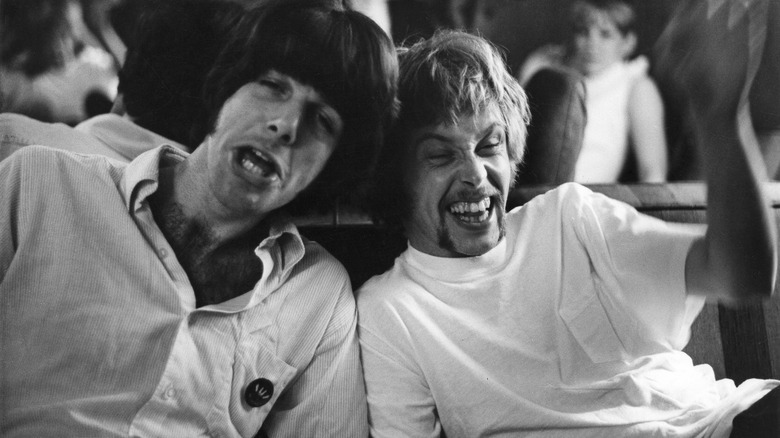The Tragic Real-Life Story Of Jefferson Airplane's Original Drummer, Skip Spence
There are a number of musicians whose names could come to mind when talking about Jefferson Airplane, its lighter, softer spin-off, Jefferson Starship, and that group's own spin-off band, Starship. Most notably, Grace Slick sang female lead vocals for all three bands. And while originally not part of the second group, Airplane's lead male vocalist, Marty Balin, joined Jefferson Starship soon after they formed, reprising his old role. But while the voices behind those acts are arguably the most recognizable, not much is said about their drummers.
Alexander "Skip" Spence is possibly the only exception to that last statement, and it isn't just because he was the first person banging the skins for Jefferson Airplane. The Canadian-born Spence was only on board for the Airplane's debut album, but what followed was a fascinating, yet ultimately troubled musical career that most notably included his time with Moby Grape and the release of his solo album "Oar," a commercial flop that influenced many a well-known musician, including the likes of Led Zeppelin's Robert Plant, Wilco's Jeff Tweedy, and late Screaming Trees frontman Mark Lanegan. Here's a closer look at Spence's tragic life story, starting from his brief stint with Jefferson Airplane and the unusual way he was invited to join the would-be psychedelic rock trailblazers.
How Spence joined ... and was fired from the Airplane
Prior to joining Jefferson Airplane, Skip Spence was briefly a member of the San Francisco-based garage rock band The Other Side, playing rhythm guitar for the group in 1965 when they were still known as The Topsiders. However, he was not exactly a multi-instrumentalist at the time Jefferson Airplane singer Marty Balin invited him to join his band — if we are to believe what was written in another 1960s band's biography. According to John Einarson's book "For What It's Worth: The Story of Buffalo Springfield," Spence was hired by the Airplane because he looked like a drummer. Yes, he was far more comfortable playing guitar, but because he looked the part, he got the job ... and didn't end up staying too long after playing on the group's debut album, "Jefferson Airplane Takes Off."
As further noted in "For What It's Worth," Spence took a vacation to Mexico without telling his bandmates, and when he returned, he was given the pink slip and replaced behind the kit by the far more experienced Spencer Dryden. Interestingly, Spence was under consideration in late 1966 to replace original Buffalo Springfield drummer Dewey Martin, but instead of joining Stephen Stills and Neil Young's pre-CSNY venture, he chose to play guitar for the band Moby Grape, a promising San Francisco band that was just about to get off the ground.
Moby Grape: A talented band that didn't realize its potential
Moby Grape was formed in San Francisco in late 1966 by former Jefferson Airplane manager Matthew Katz, who made Spence his first recruit; later joining were two other guitarists, Peter Lewis and Jerry Miller, bassist Bob Mosley, and drummer Don Stevenson. Unlike other bands that only featured one or two lead singers and primary songwriters, all five members of Moby Grape contributed vocals and wrote songs. (They were also among the few that featured three guitarists.) All this, plus their eclectic blend of musical influences, worked in their favor, and they had quite the buzz in the lead-up to the release of their self-titled 1967 debut album on Columbia Records.
It was a case of "too much of a good thing" when it came to that buzz surrounding Moby Grape, and sources such as AllMusic have noted how their label may have overhyped them. The band released five singles from their debut album, with only one of them, "Omaha," cracking the Billboard Hot 100; it peaked at an unremarkable No. 88 in the summer of 1967. (The parent album made it to a solid but unspectacular No. 24 on the Billboard 200.)
Moby Grape's follow-up release, 1968's "Wow/Grape Jam," peaked slightly higher on the album charts at No. 20, but AllMusic pointed out how the studio half of the double album ("Wow") suffered from uneven songwriting and inconsistent musicianship, with the live half ("Grape Jam") being "almost a total waste, consisting of bad jams." The group's subsequent three albums all failed to make the top half of the Billboard 200, but Spence was no longer (or was barely) a part of Moby Grape when those records were released. And it was during the making of "Wow/Grape Jam" that things took a tragic turn for the young musician.
The fire axe incident
It would seem that Skip Spence's drug use and mental health issues first reared their head while Moby Grape was recording the studio half of their aforementioned sophomore release, "Wow/Grape Jam," in 1968. According to bandmate Jerry Miller, Spence got mixed up with a rough crowd while the group was staying at New York's Hotel Albert, disappeared for some time, and came back a completely changed man. "There were some people there that were into harder drugs and a harder lifestyle, and some very weird s***. And so he kind of flew off with those people," Miller told Jeff Tamarkin in an interview for the latter's 2003 book, "Got a Revolution! The Turbulent Flight of Jefferson Airplane."
It was at this point that Spence started taking copious amounts of LSD, and as Miller further recalled, the onetime Jefferson Airplane drummer drastically changed his appearance after returning to the hotel, shaving off his beard and donning a black leather jacket. What was much more concerning, though, was how he chopped at the door of the hotel room shared by Miller and Don Stevenson with a fire axe. After heading to the studio to track his two bandmates down, he was apprehended by police officers, taken to jail, and eventually sent to the Bellevue Hospital in Manhattan for six months of psychiatric care.
If you or someone you know needs help with mental health, please contact the Crisis Text Line by texting HOME to 741741, call the National Alliance on Mental Illness helpline at 1-800-950-NAMI (6264), or visit the National Institute of Mental Health website.
Spence's only solo record was an unmitigated flop but an eventual cult classic
After his discharge from Bellevue, Skip Spence went to work on what would be his first and only solo studio album, "Oar." The 1969 release has gone on to become a cult classic of sorts, but it was initially (and allegedly) the lowest-selling album in Columbia Records history to that point, according to Louder. Though dark and disturbing, "Oar" had its share of humorous moments, and was filled with well-written lyrics and melodies that conveyed the many facets of Spence's complex persona. "'Oar' is really dark, but before that Skip was a very light, humorous person," said Moby Grape producer David Rubinson. "He was a happy guy, but also extremely fiery. He could get insanely angry. Skip had demons, like we all do, but he was really more at the mercy of them than most people."
Following "Oar," Spence barely participated in Moby Grape activities, and when the band dissolved in the early '70s, he bounced around from band to band, dealing with escalating drug and alcohol issues behind the scenes. According to Spence's fellow Moby Grape singer-guitarist Peter Lewis, his mental health had likewise deteriorated substantially when the group reunited in 1978. "There was a demonic residue from what had gone on in New York during 'Wow,'" Lewis recalled. "It was similar to what the Catholics used to tell me about possession. That's what the acid does to you. He was having visions of axe murderers."
If you or anyone you know is struggling with addiction issues, help is available. Visit the Substance Abuse and Mental Health Services Administration website or contact SAMHSA's National Helpline at 1-800-662-HELP (4357).
Spence's final years
Per Louder, Skip Spence continued writing songs in the 1980s and 1990s, but aside from his well-documented personal demons, he was also dealing with extended periods of homelessness; in 1981, he became a ward of the state of California. By the early-to-mid-'90s, he was rejoining Moby Grape for reunion shows, and had even been asked to write a song for "Songs in the Key of X," the soundtrack album for "The X-Files." However, Spence's spoken-word composition, "The Land of the Sun," was ultimately rejected.
During the final years of his life, Spence lived in a trailer in San Jose, California, where Peter Lewis (pictured above with Spence in 1967) and other old bandmates would occasionally visit. While it appears he found some peace of mind through religion, Lewis told State of Mind Music that it was still evident that Spence remained troubled in other ways. "He was helpless in a way in terms of being able to define anything or control his feelings," the musician said.
Skip Spence died of lung cancer on April 16, 1999, only two days before his 53rd birthday. Looking back on his friend's legacy, producer David Rubinson stressed that Spence was not the "crazy" person many people made him out to be. "He was desperately in touch with the biggest realities in the universe," he explained. "Somehow he could see and feel things that were enormous, meaningful, global. And he suffered from that because it was so painful."

